Anna Karenina (1985)
 Character Name: Count Alexei Vronsky
Character Name: Count Alexei Vronsky
Reviewed by Judy Thomas
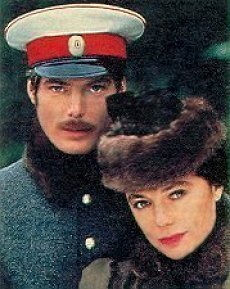 Anna Karenina, Leo Tolstoy's seemingly immortal tale of forbidden love in Czarist Russia, has been told many times and in many languages and formats (including a 10-part BBC miniseries). Most recently, it was done as a feature film in 1997. Nevertheless, it was a bit of a surprise when CBS announced its intention to produce a lavish three-hour version of this classic for commercial television in the mid-1980's. The bold project was sufficiently attractive that both Jacqueline Bisset and Christopher Reeve were persuaded to make their to make their prime-time television debuts in this film which first aired on Tuesday, March 26, 1985.
Anna Karenina, Leo Tolstoy's seemingly immortal tale of forbidden love in Czarist Russia, has been told many times and in many languages and formats (including a 10-part BBC miniseries). Most recently, it was done as a feature film in 1997. Nevertheless, it was a bit of a surprise when CBS announced its intention to produce a lavish three-hour version of this classic for commercial television in the mid-1980's. The bold project was sufficiently attractive that both Jacqueline Bisset and Christopher Reeve were persuaded to make their to make their prime-time television debuts in this film which first aired on Tuesday, March 26, 1985.
The story begins in St. Petersburg as Jacqueline Bisset's Anna is saying goodbye to her husband (Paul Scofield) and son before leaving for Moscow in an attempt to save the marriage of her adulterous brother, Stiva. While on the train, she shares a compartment with a woman who regales her with stories of her extraordinary son, Count Vronsky, played by Reeve. Anna meets Vronsky at the train station and sparks fly immediately. When they encounter each other again at a dance, their attraction blossoms into mutual obsession--not a good thing in 19th-century Russia where a woman could lose a great deal by divorce, including the right to see her own children. But this is, after all, a story about passion--love so intense that all logic is abandoned and life itself might even be sacrificed.
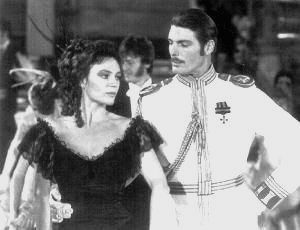 It is the beautiful dance scene at a grand ball that is my favorite in this film. Stiva's sister-in-law, Kitty, convinced that Vronsky is in love with her, persuades Anna to accompany her to the dance. Kitty believes that Vronsky will ask her to marry him that very night and even predicts when--while they dance the mazurka. But when the time comes, Vronsky asks Anna, not Kitty, to dance. We feel Kitty's pain and embarrassment, for who among us has not suffered a similar delusion. And Jacqueline Bisset does a beautiful job of communicating her emotions as her initial discomfort for doing something she knows will hurt Kitty gives way to passionate abandon. For his part, Christopher Reeve plays Vronsky exactly as he should--a man with "all the world at his feet, and all its women, too." He is young, rich, and handsome and he wants what he wants without thought of possible consequences. Yet by the end of Anna Karenina, even he will have learned the heartbreak that can come from wanting--and getting--that which is forbidden.
It is the beautiful dance scene at a grand ball that is my favorite in this film. Stiva's sister-in-law, Kitty, convinced that Vronsky is in love with her, persuades Anna to accompany her to the dance. Kitty believes that Vronsky will ask her to marry him that very night and even predicts when--while they dance the mazurka. But when the time comes, Vronsky asks Anna, not Kitty, to dance. We feel Kitty's pain and embarrassment, for who among us has not suffered a similar delusion. And Jacqueline Bisset does a beautiful job of communicating her emotions as her initial discomfort for doing something she knows will hurt Kitty gives way to passionate abandon. For his part, Christopher Reeve plays Vronsky exactly as he should--a man with "all the world at his feet, and all its women, too." He is young, rich, and handsome and he wants what he wants without thought of possible consequences. Yet by the end of Anna Karenina, even he will have learned the heartbreak that can come from wanting--and getting--that which is forbidden.
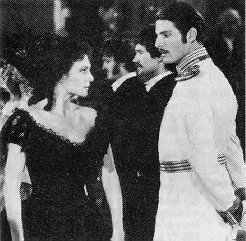 For Reeve, the chance to play Vronsky must have been irresistible--his father, Franklin, is a noted scholar of Russian literature who had been Robert Frost's translator during his trip to that country during the Cold War. The young actor surely had an appreciation for Tolstoy's work and he prepared for the film by reading Russian history. But in view of later events, Anna Karenina takes on a special and very melancholy significance. It was for this film that Christopher Reeve learned to ride horses and developed the passion for cross-country jumping that would lead him to eventual disaster.
For Reeve, the chance to play Vronsky must have been irresistible--his father, Franklin, is a noted scholar of Russian literature who had been Robert Frost's translator during his trip to that country during the Cold War. The young actor surely had an appreciation for Tolstoy's work and he prepared for the film by reading Russian history. But in view of later events, Anna Karenina takes on a special and very melancholy significance. It was for this film that Christopher Reeve learned to ride horses and developed the passion for cross-country jumping that would lead him to eventual disaster.
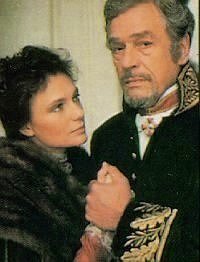 Reeve took a 30-day intensive course in horseback riding to be able to handle a steed for the film. The Hungarian National Equestrian Team was hired and Reeve managed to ride well enough to be filmed galloping along the flat in the steeplechase scene while a double was used for jumps. It must have been exciting as shots had to be redone when the horses outraced the camera truck. In his autobiography, Still Me, Reeve said: "The whole experience was absolutely exhilarating; I was bitten by the riding bug. I realized I had been in over my head in Hungary, so when I came home I decided to take up the sport properly."
Reeve took a 30-day intensive course in horseback riding to be able to handle a steed for the film. The Hungarian National Equestrian Team was hired and Reeve managed to ride well enough to be filmed galloping along the flat in the steeplechase scene while a double was used for jumps. It must have been exciting as shots had to be redone when the horses outraced the camera truck. In his autobiography, Still Me, Reeve said: "The whole experience was absolutely exhilarating; I was bitten by the riding bug. I realized I had been in over my head in Hungary, so when I came home I decided to take up the sport properly."
Anna Karenina was filmed on location in Hungary with first-class production values. The teleplay is by James Goldman (The Lion in Winter and Nicholas and Alexandra). With the exception of Reeve, all cast members are British and more than 3,000 costumes were rented from Moscow and London for authenticity. A Russian history professor was on call for costume and protocol details and the trains seen steaming in the film are from Tolstoy's era. Not one scene was shot in a studio--all filming was done on location in castles, museums, hotels, and the Hungarian countryside. For scenes such as the ball and the horse-race sequence, more than 350 extras were used.
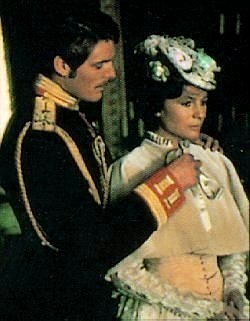 Still, conditions on the set seem to have been less than idyllic. The creature comforts normally accorded Hollywood stars were absent and Reeve noticed the differences between television and film productions saying: "...in TV, the budget is the budget. You can't steal one more minute than you are allotted." Hungarian unions ruled the set and had to be bargained with for any concessions. There were also distinct differences in the ways Bisset and Reeve worked. Bisset said: "Chris rehearses differently from me. You don't get much from me at rehearsal, I resist being overfocused...I wanted to be as instinctive as Anna is, not to plan anything. Chris needs to talk about things a great deal. His working process is more tortured than mine. He needs to know a zillion details before he focuses. Ironically, in the past, I've been guilty of driving directors crazy with a million details, but on this project I'm entirely different." For his part, Reeve recognized the demands on Bisset, who appears in nearly every scene of the film and said: "But if she finds it easier that way, we adjust...after all, she's the lead, and this is the part that demands the most of her as an actress." Reeve had rejected the advice of friends who, concerned about the film's focus on Anna, said, "The first time you go on a prime-time vehicle, it should be yours". Reeve's response was simply: "What a beautiful story. I'd like to be part of it."
Still, conditions on the set seem to have been less than idyllic. The creature comforts normally accorded Hollywood stars were absent and Reeve noticed the differences between television and film productions saying: "...in TV, the budget is the budget. You can't steal one more minute than you are allotted." Hungarian unions ruled the set and had to be bargained with for any concessions. There were also distinct differences in the ways Bisset and Reeve worked. Bisset said: "Chris rehearses differently from me. You don't get much from me at rehearsal, I resist being overfocused...I wanted to be as instinctive as Anna is, not to plan anything. Chris needs to talk about things a great deal. His working process is more tortured than mine. He needs to know a zillion details before he focuses. Ironically, in the past, I've been guilty of driving directors crazy with a million details, but on this project I'm entirely different." For his part, Reeve recognized the demands on Bisset, who appears in nearly every scene of the film and said: "But if she finds it easier that way, we adjust...after all, she's the lead, and this is the part that demands the most of her as an actress." Reeve had rejected the advice of friends who, concerned about the film's focus on Anna, said, "The first time you go on a prime-time vehicle, it should be yours". Reeve's response was simply: "What a beautiful story. I'd like to be part of it."
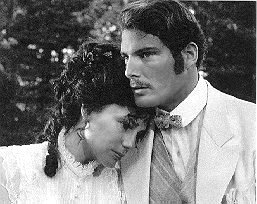 Watch for Christopher Reeve's daughter Alexandra, who made her screen debut in this film as Anna and Vronsky's offspring. Several babies were used for the part--Alexandra played the child at the age of about ten months and is shown walking.
Watch for Christopher Reeve's daughter Alexandra, who made her screen debut in this film as Anna and Vronsky's offspring. Several babies were used for the part--Alexandra played the child at the age of about ten months and is shown walking.
There is a video of Anna Karenina available for purchase. The film is not only shortened--it is butchered from 137 to 96 minutes. The pivotal steeplechase scene is removed entirely and the rest of the film is so chopped apart as to be nearly impossible to follow. All of this is particularly inexcusable because the cheesy video is done in EP and all of the original footage could have easily been included. Fortunately, the uncut film was shown a number of times on the Encore Love Story channel in the winter of 1997-98 and the Romance channel in the Summer of 1998. Next time it is shown, put an extra long tape in the VCR, set it to SP, and sit back to watch a timeless love story beautifully told.
REVIEWS
As Count Vronsky, Reeve cuts as dashing and romantic a figure in his trim blue, gold and white uniforms as he did in his red, yellow and blue Superman outfit. Laurel Gross in New York Post, March 26, 1985
Anna Karenina succeeds in translating complex Tolstoy into cultured TV. The period costumes are gorgeous, the landscape lovely, the lead characters suitably beautiful and glamorous. Jacgueline Bisset and Christopher Reeve--as the lovers Anna and Vronsky--bristle with varieties of unspeakable passion. It's all very exciting and sad and all those qualities you expect from a highly charged drama. And the themes of this terribly tragic tale are universal--passion is fleeting, love is fragile and sinners always pay. As the title character, Bisset glows and glowers as the beauty she is. Garbo may have been a more keenly tragic, melodramatic Anna, but Bisset is perfect for TV's needs--a stunning, heart-breaking heroine. And Reeve's Vronsky has the perfect pitch of the lovelorn naif--youthfulness, extravagance and crass opportunism. Anna Karenina gives hopeless romantics deep cause for worry. Here we are reminded that love is war. And nothing's fair. Monica Collins in USA Today, March 26, 1985.
Back to the top

News Reports | Biography | Fundraising | Online Shop | Autobiography
Movie Reviews | Contact Info | Have Your Say | Photo Gallery | Song Lyrics
Transcripts | Mailing Lists | Interviews | Other Websites | About Us | Search
This page is Copyright © 1999-2014, Steven Younis. All Rights Reserved
Jump to Steven Younis' unofficial Superman Homepage
|

 Anna Karenina, Leo Tolstoy's seemingly immortal tale of forbidden love in Czarist Russia, has been told many times and in many languages and formats (including a 10-part BBC miniseries). Most recently, it was done as a feature film in 1997. Nevertheless, it was a bit of a surprise when CBS announced its intention to produce a lavish three-hour version of this classic for commercial television in the mid-1980's. The bold project was sufficiently attractive that both Jacqueline Bisset and Christopher Reeve were persuaded to make their to make their prime-time television debuts in this film which first aired on Tuesday, March 26, 1985.
Anna Karenina, Leo Tolstoy's seemingly immortal tale of forbidden love in Czarist Russia, has been told many times and in many languages and formats (including a 10-part BBC miniseries). Most recently, it was done as a feature film in 1997. Nevertheless, it was a bit of a surprise when CBS announced its intention to produce a lavish three-hour version of this classic for commercial television in the mid-1980's. The bold project was sufficiently attractive that both Jacqueline Bisset and Christopher Reeve were persuaded to make their to make their prime-time television debuts in this film which first aired on Tuesday, March 26, 1985. It is the beautiful dance scene at a grand ball that is my favorite in this film. Stiva's sister-in-law, Kitty, convinced that Vronsky is in love with her, persuades Anna to accompany her to the dance. Kitty believes that Vronsky will ask her to marry him that very night and even predicts when--while they dance the mazurka. But when the time comes, Vronsky asks Anna, not Kitty, to dance. We feel Kitty's pain and embarrassment, for who among us has not suffered a similar delusion. And Jacqueline Bisset does a beautiful job of communicating her emotions as her initial discomfort for doing something she knows will hurt Kitty gives way to passionate abandon. For his part, Christopher Reeve plays Vronsky exactly as he should--a man with "all the world at his feet, and all its women, too." He is young, rich, and handsome and he wants what he wants without thought of possible consequences. Yet by the end of Anna Karenina, even he will have learned the heartbreak that can come from wanting--and getting--that which is forbidden.
It is the beautiful dance scene at a grand ball that is my favorite in this film. Stiva's sister-in-law, Kitty, convinced that Vronsky is in love with her, persuades Anna to accompany her to the dance. Kitty believes that Vronsky will ask her to marry him that very night and even predicts when--while they dance the mazurka. But when the time comes, Vronsky asks Anna, not Kitty, to dance. We feel Kitty's pain and embarrassment, for who among us has not suffered a similar delusion. And Jacqueline Bisset does a beautiful job of communicating her emotions as her initial discomfort for doing something she knows will hurt Kitty gives way to passionate abandon. For his part, Christopher Reeve plays Vronsky exactly as he should--a man with "all the world at his feet, and all its women, too." He is young, rich, and handsome and he wants what he wants without thought of possible consequences. Yet by the end of Anna Karenina, even he will have learned the heartbreak that can come from wanting--and getting--that which is forbidden. For Reeve, the chance to play Vronsky must have been irresistible--his father, Franklin, is a noted scholar of Russian literature who had been Robert Frost's translator during his trip to that country during the Cold War. The young actor surely had an appreciation for Tolstoy's work and he prepared for the film by reading Russian history. But in view of later events, Anna Karenina takes on a special and very melancholy significance. It was for this film that Christopher Reeve learned to ride horses and developed the passion for cross-country jumping that would lead him to eventual disaster.
For Reeve, the chance to play Vronsky must have been irresistible--his father, Franklin, is a noted scholar of Russian literature who had been Robert Frost's translator during his trip to that country during the Cold War. The young actor surely had an appreciation for Tolstoy's work and he prepared for the film by reading Russian history. But in view of later events, Anna Karenina takes on a special and very melancholy significance. It was for this film that Christopher Reeve learned to ride horses and developed the passion for cross-country jumping that would lead him to eventual disaster. Reeve took a 30-day intensive course in horseback riding to be able to handle a steed for the film. The Hungarian National Equestrian Team was hired and Reeve managed to ride well enough to be filmed galloping along the flat in the steeplechase scene while a double was used for jumps. It must have been exciting as shots had to be redone when the horses outraced the camera truck. In his autobiography, Still Me, Reeve said: "The whole experience was absolutely exhilarating; I was bitten by the riding bug. I realized I had been in over my head in Hungary, so when I came home I decided to take up the sport properly."
Reeve took a 30-day intensive course in horseback riding to be able to handle a steed for the film. The Hungarian National Equestrian Team was hired and Reeve managed to ride well enough to be filmed galloping along the flat in the steeplechase scene while a double was used for jumps. It must have been exciting as shots had to be redone when the horses outraced the camera truck. In his autobiography, Still Me, Reeve said: "The whole experience was absolutely exhilarating; I was bitten by the riding bug. I realized I had been in over my head in Hungary, so when I came home I decided to take up the sport properly." Still, conditions on the set seem to have been less than idyllic. The creature comforts normally accorded Hollywood stars were absent and Reeve noticed the differences between television and film productions saying: "...in TV, the budget is the budget. You can't steal one more minute than you are allotted." Hungarian unions ruled the set and had to be bargained with for any concessions. There were also distinct differences in the ways Bisset and Reeve worked. Bisset said: "Chris rehearses differently from me. You don't get much from me at rehearsal, I resist being overfocused...I wanted to be as instinctive as Anna is, not to plan anything. Chris needs to talk about things a great deal. His working process is more tortured than mine. He needs to know a zillion details before he focuses. Ironically, in the past, I've been guilty of driving directors crazy with a million details, but on this project I'm entirely different." For his part, Reeve recognized the demands on Bisset, who appears in nearly every scene of the film and said: "But if she finds it easier that way, we adjust...after all, she's the lead, and this is the part that demands the most of her as an actress." Reeve had rejected the advice of friends who, concerned about the film's focus on Anna, said, "The first time you go on a prime-time vehicle, it should be yours". Reeve's response was simply: "What a beautiful story. I'd like to be part of it."
Still, conditions on the set seem to have been less than idyllic. The creature comforts normally accorded Hollywood stars were absent and Reeve noticed the differences between television and film productions saying: "...in TV, the budget is the budget. You can't steal one more minute than you are allotted." Hungarian unions ruled the set and had to be bargained with for any concessions. There were also distinct differences in the ways Bisset and Reeve worked. Bisset said: "Chris rehearses differently from me. You don't get much from me at rehearsal, I resist being overfocused...I wanted to be as instinctive as Anna is, not to plan anything. Chris needs to talk about things a great deal. His working process is more tortured than mine. He needs to know a zillion details before he focuses. Ironically, in the past, I've been guilty of driving directors crazy with a million details, but on this project I'm entirely different." For his part, Reeve recognized the demands on Bisset, who appears in nearly every scene of the film and said: "But if she finds it easier that way, we adjust...after all, she's the lead, and this is the part that demands the most of her as an actress." Reeve had rejected the advice of friends who, concerned about the film's focus on Anna, said, "The first time you go on a prime-time vehicle, it should be yours". Reeve's response was simply: "What a beautiful story. I'd like to be part of it." Watch for Christopher Reeve's daughter Alexandra, who made her screen debut in this film as Anna and Vronsky's offspring. Several babies were used for the part--Alexandra played the child at the age of about ten months and is shown walking.
Watch for Christopher Reeve's daughter Alexandra, who made her screen debut in this film as Anna and Vronsky's offspring. Several babies were used for the part--Alexandra played the child at the age of about ten months and is shown walking.